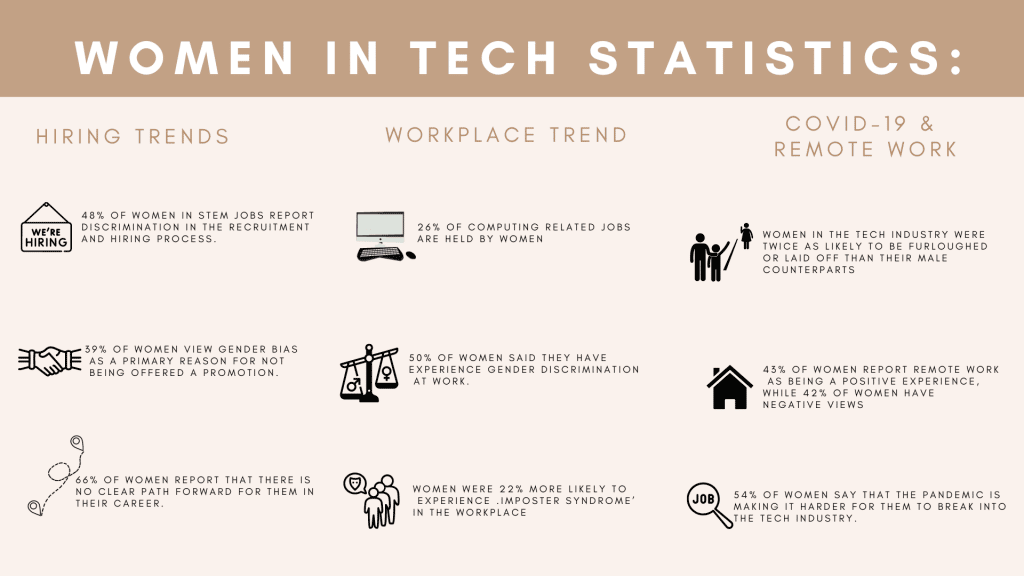
In the 21st Century, it is shocking to see there are still low diversity statistics in the tech sector. Movements such as The Equal Pay Act which became a part of the Equality Act in 2010, protect women of different backgrounds and ethnicities to ensure they are treated fairly in the workplace and paid equal to their male co-workers. Other significant movements which have empowered and supported women such as the #MeToo movement launched in 2006, but the campaign gained widespread attention in 2017 are made to assist survivors of sexual violence and give women a voice so that they can be heard. Important movements such as these have helped put a spotlight on and address the unjust treatment of women within society. With this progress, it is surprising to see there are still problems concerning diversity in the workforce.
Many companies are recognising the importance of having a diverse workforce. Companies are spending billions to increase diversity and inclusion efforts as this is a serious issue which needs addressing. A recent study found that 68% of business leaders report a lack of diversity in their tech workforce.
Furthermore, this can be seen in recent data where 5 of the largest companies on the planet (Amazon, Apple, Facebook, Google, and Microsoft) only have a workforce of 34.4% of women (Women in Tech Statistics, 2022). The same report also discovered there was only an 2% increase of women in software engineer hires over the last 21 years. One theory for this very low percentage is the ‘broken rung’ in the career ladder. ‘The broken rung’ is the awareness of the promotion gap at the first step up to manager level, getting equal numbers of women and men into management positions. This ‘broken rung’ puts women at a disadvantage and leads to tech companies never breaking the cycle of hiring employees of the same gender and race.
When it comes to board members, in many companies, women are still a minority. With 20% of the world’s biggest corporations having no women directors, (Liliana Nicoleta Simionescu, 2022) the impact of this leaves negative effects. Adams and Ferreira (2009) found that women in a director position have a crucial impact on corporate governance as they are more dedicated to attending meetings and men are more likely to follow in their lead and improve their attendance. Board diversity also improves a firm’s value as it allows persons with different experiences, backgrounds, ages, and genders to participate in the decision-making process and come forth with new additional ideas.
It is no secret that the tech sectors’ professional, managerial, and executive labour forces are overwhelmingly white and male. One article found that 80% of firms displayed a pattern of very minimal increases in diversity. However, the method for increasing diversity is to increase diversity at managerial levels.
The woman experience in the tech sector.
So, what is the woman experience in this male dominated sector?
A report from tech nation found that; only 22% of tech directors are women and 19% of tech workers are women. The proportion of men and women being appointed directors of tech companies in the UK remains almost the same since 2000.
Women working in the tech sector find themselves up against several barriers which prevent them from starting or progressing in the tech industry. Some of these barriers include the lack of mentors. A recent study found that 48% of women found that there was a lack of mentors to help them progress in their careers and that 42% of the women said there was a lack of female role models within this sector.
Another prevention of progression in the tech industry is that there is gender bias in the workplace. It is reported that 39% of women experienced gender bias. This is evident in the 36% of women who pointed out they have unequal growth opportunities compared to men.
‘Diversity in Tech’ statistics shows that year after year women are underpaid and underrepresented with only 25% of women making up computer-science-related jobs (Pew Research Centre, 2022). The report states women are underrepresented in engineering making up only 14% of the workforce. Furthermore, only 15% of entry-level positions are held by women of colour versus 35% of white men. This creates a negative effect as women consistently do not receive promotions which contributes to dissatisfaction and unhappiness in their job.
Why is there a lack of diversity in the tech workforce?
The IT sector also faces many male gender stereotyping, due to the mindset wherein females are advised to abandon the job market and focus on their infants making the husband the breadwinner. In several societies females are usually supposed to be accountable for performing domestic tasks, hence their capacity in the workforce is constrained (Peng and She 2020).
In the last 20 years, the number of female students enrolled in STEM-related subjects has decreased and the number of women resigning from technological job positions remains unacceptably high. One reason behind this may be that the tech sector fails to take advantage of as much brain power, creativity, and knowledge as possible, as recent studies demonstrate female students excelling in STEM subjects with 40% receiving an A or A*.

Studies suggest that career paths start to diverge before the age of 15 years old and that boys are more than twice as likely as girls to expect to work in scientist or engineer roles. However, the STEM gender gap begins earlier than this, it starts from the inborn difference between sexes regarding STEM aptitudes.
Arguably gender roles, patterns and stereotypes are installed in the family and society, especially where appropriate careers for men and women are concerned. These stereotypes begin in toy retailers, creating toys that have a gender placed upon them. For example, a baby set will be advertised to a little girl and builder tools are advertised to little boys. To change these stereotypes, we need to include mixed groups of boys and girls playing without any stereotypes attached to the toy.
Further research found that across UK universities only 3% of females say a career in technology is their first choice and 78% of the students said they could not name a famous female working in tech. The lack of knowledge and representation for females in the tech sector is another reason why we see the lack of diversity in this sector. Females are not considering tech careers as they are not given enough information on what working in the tech sector involves. Furthermore, a lack of female role models will add to these low statistics, it reinforces the perception that this career is not for them. This is further confirmed when a quarter of the female students stated they are put off from a STEM career as it is too male dominated.
Women working in the tech sector find several barriers preventing them from starting or progressing in work. The work-life conflicts preventing women from progressing in the Tech sector include long working hours, career breaks related to motherhood and travel requirements. One way to rectify this is by having flexible options, and there should be no stigma behind this without any negative consequences or penalties for women choosing a flexi working life.

How can these statistic change?
The workforce attitude needs to change, managers, co-workers and executives must call out instances where a woman’s hard work is going unnoticed or not acknowledged this will only build a stronger office culture. To highlight and praise unnoticed work, send out frequent emails or internal messages to the group highlighting ideas and projects.
To help rebuild the ‘broken rung’ companies will need to start accepting more women in the interview process. Women often get overlooked for managerial positions because there are fewer of them in the workplace, therefore we need more women hired for entry-level positions and more women can be considered for promotions to managerial spots. This is important as a diversity of opinions on tech company boards can only enhance a business.

Businesses are addressing the imbalance in the workplace by creating parental leave an area of great importance for tech companies. This ensures new mothers will be able to continue their career pursuits, with an increase of 24% of representation of women in the c-suite over the past 5 years.
The 9 to 5 job and rigidity of staying only at the office or only at home should become obsolete to help working mothers balance childcare and other personal matters with their careers. During the pandemic just about every notion of life changed, 57% of women state they felt burned out from mandatory work-from-home. They found it a struggle to balance being both a working professional and a functioning parent. A recent study found that 1.2 million parents exited the workforce and that ¾ of those people were women. When asked if the flexible working arrangement was more suitable to their needs 64% of women said they wanted an increase in flexible working.
A top company creating change and addressing the diversity issue is Amazon as they offer 12 ‘affinity groups’ which are employee resource groups to bring employees together across business units and locations around the world. These groups include Amazon Women in Engineering (AWE). They also collaborate with programs that support underrepresented communities in tech by providing access to AWS credits and learning modules. Impactful programs such as this will boost a company’s reputation in the market and make them a more attractive organisation. This should be seen as a huge opportunity by getting diversity and inclusivity right in tech will benefit everyone.
Here at Candour Solutions, we are advocates for equality in the workplace and want to see a surge of diversity in the tech sector with more females in management positions. During our hiring process we choose candidates purely on skills and talent, we will never let gender or ethnicity effect the candidate process.
If you or you know anyone looking for a new role in tech, please get in touch. We have many exciting roles on offer whether you are entry level or want to make that step to a managerial position we would be happy to help you through this process.
Contact us at:
hello@candour-solutions.co.uk | 0161 714 7120

